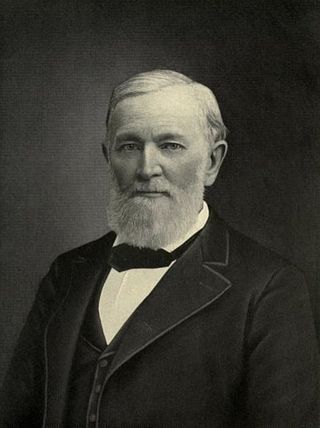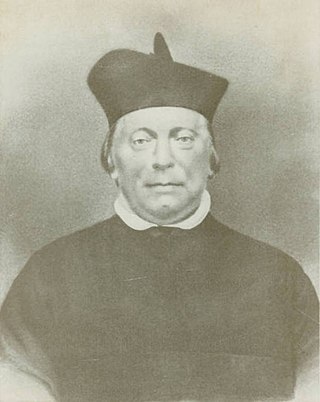
The Basilica of Saint Louis, King of France, formerly the Cathedral of Saint Louis, and colloquially the Old Cathedral, is a Catholic church in St. Louis, Missouri. It was the first cathedral west of the Mississippi River and until 1844 the only parish church in St. Louis. It is one of two Catholic basilicas in St. Louis and both are named for King Louis IX of France.
James Busch Orthwein was an American heir and business executive. He also owned the New England Patriots of the National Football League (NFL) from 1992 to 1993. After unsuccessfully attempting to relocate the franchise to his home city of St. Louis, he sold the Patriots to Robert Kraft in 1994.

Edward James Gay was a financier and member of United States Congress. He and his wife Lavinia Hynes were the grandparents of U.S. Senator Edward James Gay.

Seth Wallace Cobb was a U.S. Representative from Missouri.
William Robert Orthwein was an American sportsman, attorney, business executive and political activist.

Edward Lowe Martin was an American politician who served as the Mayor of Kansas City, Missouri. The town of Martin City was named in honor of him; and would eventually be incorporated into and become a neighborhood of Kansas City in 1963.

Colonel Frederick Wilhelm Victor Blees was a German immigrant to the United States who became a philanthropist, teacher, founder of Blees Military Academy, and the acknowledged chief benefactor of the city of Macon, Missouri.

Cyrus Packard Walbridge was the 28th mayor of St. Louis, Missouri, serving from 1893 to 1897. He was also the unsuccessful Republican candidate for Governor of Missouri in the 1904 election.

James Monroe Seibert was an American politician. He served as the State Treasurer of Missouri from 1885 to 1889.

George Ingham Barnett (1815–1898) was an architect from St. Louis, Missouri. He was called "The Dean of St. Louis Architecture" for his contributions to the buildings of St. Louis as well as for his influence on other architects in the United States.

Firmin Vincent Desloge II was an American industrialist lead mining pioneer in the disseminated lead fields of the Southeast Missouri Lead District and member of the Desloge family in America.

Richard H. Keith, also known as R. H. Smith, was a coal and lumber businessman. He arrived in Kansas City, Missouri in 1871 with forty dollars and started a small coal yard. From that beginning evolved an empire spanning several states, that included coal, timber, sawmills, railroads, and even the building of towns.
Orthwein is a surname. Notable people with the surname include:
William R. Orthwein Jr. was an American businessman and philanthropist.
William David Orthwein was a German-born American Civil War veteran and grain merchant in St. Louis, Missouri.
Frederick C. Orthwein was an American businessman from St. Louis, Missouri.
Percy Orthwein was an American heir and business executive in advertising from St. Louis, Missouri, United States.
The St. Louis Mining and Stock Exchange was an American regional stock exchange. It formed in St. Louis, Missouri on December 2, 1880. It closed in 1893 during a financial depression.

Peter Joseph Verhaegen was a Belgian Catholic priest, Jesuit, and missionary to the Midwestern United States who became the first president of Saint Louis University and St. Joseph's College in Bardstown, Kentucky.











